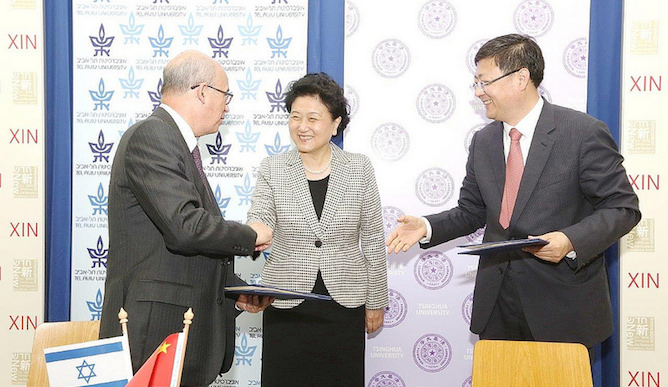The launch of a $300 million joint research project between Tel Aviv University and Tsinghua University in Beijing has the academic communities and political echelons in both countries buzzing.
The opening of the XIN Center was announced at Tel Aviv University in mid-May amid great fanfare. The name is a play on words; “xin” means “new” in Chinese, and in English the “X” coupled with the “in” can stand for cross-innovation, cross-intelligence and/or cross-ingenuity.
Chinese Vice Premier Liu Yandong, Tsinghua University President Chen Jining and TAU President Joseph Klafter gathered for the center’s inauguration along with leading members of the business and science sectors in Israel and China. The cooperation agreement between the two universities had been signed the previous day at a press conference.
The endeavor, to be funded by government and private sources, will initially focus on nanotechnology, with an emphasis on medical and optics applications, and later branch out into fields such as biotech and energy.
So far, nearly a third of the money has been raised for the project, which will involve recruiting research fellows from among the best and brightest of the graduate students of both universities to work in tandem (and fly back and forth) to develop products for eventual commercialization.
To raise the rest of the money, an investment fund is being established by Infinity Group, Israel’s largest investment firm, to seed ventures initiated by XIN fellows.
Infinity Managing Partner Amir Gal-Or said that his company “has committed to mentoring and investing in select projects at the XIN Center, which have the potential to positively change the world.”
Science is common denominator
The idea for the ambitious program began inauspiciously, during a trip by Israeli scientists to meet with their counterparts in China.
“The project started bottom-up in Beijing,” said Klafter. “We fell in love with one another.”
This was in spite of the challenge involved in Hebrew-speakers and Chinese-speakers communicating in English.
“Science is the common denominator that brings us all together,” said Prof. Yael Hanein, who heads the Tel Aviv University Center for Nanoscience and Nanotechnology.
She will serve as co-director of XIN, along with Prof. Quanshui Zheng, head of Tsinghua University’s Center for Nano and Micro Mechanics. Nevertheless, Hanein is now intensively studying Chinese.
But language is not the main gap between the Israeli and Chinese students. As both Hanein and Jining pointed out, it is the cultural differences that are the most pronounced – and also a positive contrast that can be mutually beneficial.
“The Israelis are less obedient than the Chinese,” observed Hanein.
“The Israelis challenge authority,” said Jining. “And the Chinese bring harmony. The two groups learn from each other and create a balance.”
Jining added that though Tsinghua University collaborates with other academic institutions around the world, “This is the first that is so in-depth. We see it as a vehicle for nurturing future leaders of innovation – for cultivating and training a new generation of entrepreneurs.”
The largest Israeli-Chinese academic venture
Indeed, according to Klafter, the XIN Center is “unprecedented in size and scope,” despite its being one of a growing number of joint Israel-China ventures.
For example, in September 2013, the Technion-Israel Institute of Technology in Haifa signed a $130 million agreement with Shantou University in Guangdong to establish a tech institute in the Chinese province.
More recently, as ISRAEL21c reported in early May, a joint-venture agricultural technology incubator is slated to be built in Anhui Province, China. It will operate under the auspices of Trendlines Agtech, a specialized investment unit of Israel’s Trendlines Group, which supports early-stage, promising medical and agricultural technology companies in Israel.
These kinds of cooperative efforts are part of a comprehensive plan by Prime Minister Benjamin Netanyahu to strengthen economic and technological ties with the People’s Republic. It was the impetus for his trip to China last year.
“China is Israel’s largest trading partner in Asia and fast becoming perhaps Israel’s largest trading partner, period, as we move into the future,” Netanyahu said during a meeting with Vice Premier Yandong at his office in Jerusalem following the XIN launch in Tel Aviv.
“We see the great success of China. We admire China and we think there are complementary things that Israel brings to this relationship.”
XIN co-director Zheng takes a similar view.
“I believe that the … perfect synergy between China and Israel provide[s] a unique opportunity for the XIN Center to facilitate the merging of Chinese, Israeli and other cultures to develop a new paradigm in innovative education and research towards solving local and global grand challenges,” he said.
















